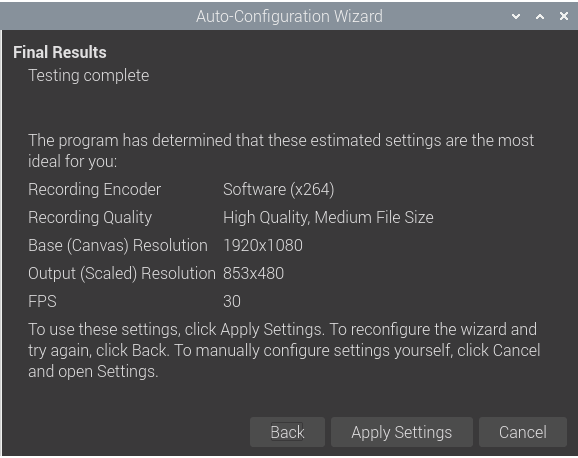Last Updated on August 20, 2020
Installation
The process involves quite a few steps.
There’s a lot of dependencies that need to be satisfied. Fortunately, most of the dependencies are present in the Raspbian repositories; some (or all) may already be present on your system. I also need to download and install packages for libfdk-aac1 and libfdk-aac which are Fraunhofer FDK AAC Codec Libraries.
Next, clone the project’s GitHub repository, compile the source code, and install the program. Here’s the specific commands:
$ sudo apt-get --allow-releaseinfo-change update
$ sudo DEBIAN_FRONTEND=noninteractive apt-get -y dist-upgrade
$ sudo apt-get -y install build-essential checkinstall cmake git libmbedtls-dev libasound2-dev libavcodec-dev libavdevice-dev libavfilter-dev libavformat-dev libavutil-dev libcurl4-openssl-dev libfontconfig1-dev libfreetype6-dev libgl1-mesa-dev libjack-jackd2-dev libjansson-dev libluajit-5.1-dev libpulse-dev libqt5x11extras5-dev libspeexdsp-dev libswresample-dev libswscale-dev libudev-dev libv4l-dev libvlc-dev libx11-dev libx11-xcb1 libx11-xcb-dev libxcb-xinput0 libxcb-xinput-dev libxcb-randr0 libxcb-randr0-dev libxcb-xfixes0 libxcb-xfixes0-dev libx264-dev libxcb-shm0-dev libxcb-xinerama0-dev libxcomposite-dev libxinerama-dev pkg-config python3-dev qtbase5-dev libqt5svg5-dev swig
$ sudo wget https://ftp.uk.debian.org/debian/pool/non-free/f/fdk-aac/libfdk-aac1_0.1.4-2+b1_armhf.deb
$ sudo wget https://ftp.uk.debian.org/debian/pool/non-free/f/fdk-aac/libfdk-aac-dev_0.1.4-2+b1_armhf.deb
$ sudo dpkg -i libfdk-aac1_0.1.4-2+b1_armhf.deb
$ sudo dpkg -i libfdk-aac-dev_0.1.4-2+b1_armhf.deb
$ sudo git clone --recursive https://github.com/obsproject/obs-studio.git
$ cd obs-studio
$ sudo mkdir build && cd build
$ sudo cmake -DUNIX_STRUCTURE=1 -DCMAKE_INSTALL_PREFIX=/usr ..
$ sudo make -j4
$ sudo make install
I don’t take the credit for these steps. The process was detailed by TheMindVirus published on the obsproject forum.
Compiling the source code took 8 minutes 50 seconds (using all 4 cores of the RPI4). Make sure you use the argument -j4 with make, else the compile time will take a lot longer.
If you start obs from the newly-created menu entry or from the command-line, you get the following error.

Instead, launch the program with the command:
OBS Studio has a very useful auto-configuration wizard which starts when you load the program for the first time. This wizard automatically tests the system and seeks to find settings that your machine can handle. This includes streaming or recording, resolution, bitrate, encoder, streaming provider and more.
Here’s what the wizard determines for the RPI4.

As you can see, the wizard doesn’t recommend recording at 1080p. Instead, it recommends an output resolution of 853×480.
Next page: Page 3 – In Operation
Pages in this article:
Page 1 – Introduction
Page 2 – Installation
Page 3 – In Operation
Page 4 – Summary
Read all my blog posts about the RPI4.
| Raspberry Pi 4 Blog | |
|---|---|
| Week 36 | Manage your personal collections on the RPI4 |
| Week 35 | Survey of terminal emulators |
| Week 34 | Search the desktop with the latest version of Recoll |
| Week 33 | Personal Information Managers on the RPI4 |
| Week 32 | Keep a diary with the RPI4 |
| Week 31 | Process complex mathematical functions, plot 2D and 3D graphs with calculators |
| Week 30 | Internet radio on this tiny computer. A detailed survey of open source software |
| Week 29 | Professionally manage your photo collection with digiKam |
| Week 28 | Typeset beautifully with LyX |
| Week 27 | Software that teaches young people how to learn basic computing skills and beyond |
| Week 26 | Firefox revisited - Raspbian now offers a real alternative to Chromium |
| Week 25 | Turn the Raspberry Pi 4 into a low power writing machine |
| Week 24 | Keep the kids learning and having fun |
| Week 23 | Lots of choices to view images |
| Week 22 | Listening to podcasts on the RPI4 |
| Week 21 | File management on the RPI4 |
| Week 20 | Open Broadcaster Software (OBS Studio) on the RPI4 |
| Week 19 | Keep up-to-date with these news aggregators |
| Week 18 | Web Browsers Again: Firefox |
| Week 17 | Retro gaming on the RPI4 |
| Week 16 | Screen capturing with the RPI4 |
| Week 15 | Emulate the Amiga, ZX Spectrum, and the Atari ST on the RPI4 |
| Week 14 | Choose the right model of the RPI4 for your desktop needs |
| Week 13 | Using the RPI4 as a screencaster |
| Week 12 | Have fun reading comics on the RPI4 with YACReader, MComix, and more |
| Week 11 | Turn the RPI4 into a complete home theater |
| Week 10 | Watching locally stored video with VLC, OMXPlayer, and others |
| Week 9 | PDF viewing on the RPI4 |
| Week 8 | Access the RPI4 remotely running GUI apps |
| Week 7 | e-book tools are put under the microscope |
| Week 6 | The office suite is the archetypal business software. LibreOffice is tested |
| Week 5 | Managing your email box with the RPI4 |
| Week 4 | Web surfing on the RPI4 looking at Chromium, Vivaldi, Firefox, and Midori |
| Week 3 | Video streaming with Chromium & omxplayerGUI as well as streamlink |
| Week 2 | A survey of open source music players on the RPI4 including Tauon Music Box |
| Week 1 | An introduction to the world of the RPI4 looking at musikcube and PiPackages |
This blog is written on the RPI4.

I’m really enjoying this series. It seems that OBS Studio is out of RPI4’s capabilities. At least until the GPU is used.
I’d like to see coverage of productivity apps on the RPI4 – things like Evernote clients covered. Any plans?
Thanks for the feedback. I’m really impressed with the RPI4 as a desktop replacement.
I’m currently testing a good spread of productivity apps on the RPI4. I’ll be reporting my findings over the next few blog articles.
Looks like obs is using software encoder although rpi4 can do fullhd HARDWARE encoding. Too bad.
You’re just repeating what Luke says in his Summary — “The RPI4 has a VideoCore VI GPU, but this isn’t being used by OBS Studio. Direct encoder support would offer much better performance.”
Some things are worth repeating
Problems installing OBS-studio on pi4
CMake Error at /usr/share/cmake-3.16/Modules/FindPackageHandleStandardArgs.cmake:146 (message):
Could NOT find Wayland (missing: WAYLAND_LIBRARIES WAYLAND_INCLUDE_DIRS)
Call Stack (most recent call first):
/usr/share/cmake-3.16/Modules/FindPackageHandleStandardArgs.cmake:393 (_FPHSA_FAILURE_MESSAGE)
cmake/Modules/FindWayland.cmake:76 (find_package_handle_standard_args)
libobs-opengl/CMakeLists.txt:55 (find_package)
— Configuring incomplete, errors occurred!
See also “/home/pi/Downloads/obs-studio/build/CMakeFiles/CMakeOutput.log”.
root@raspberrypi:/home/pi/Downloads/obs-studio/build# make -j4
make: *** No targets specified and no makefile found. Stop.
root@raspberrypi:/home/pi/Downloads/obs-studio/build#
root@raspberrypi:/home/pi/Downloads/obs-studio/build#